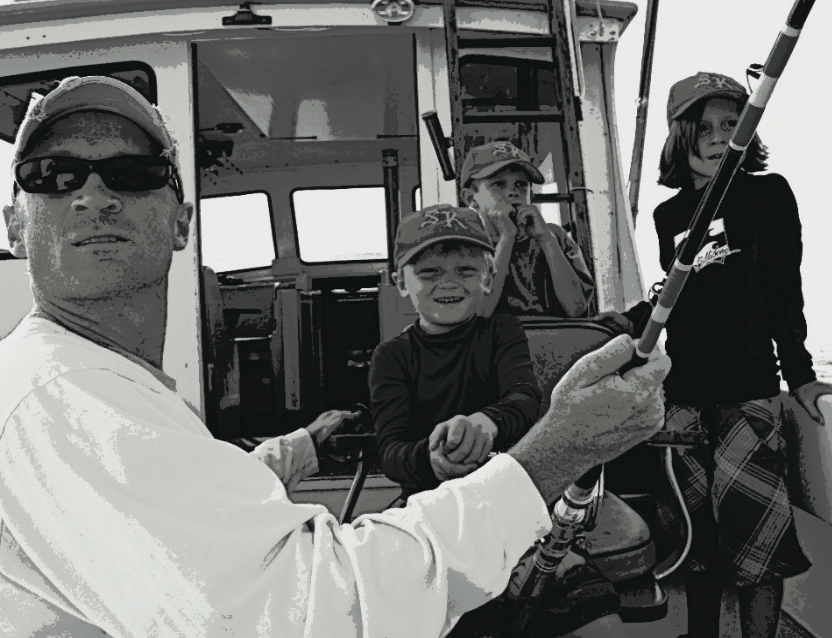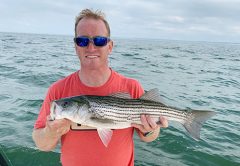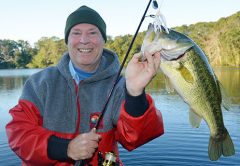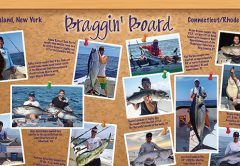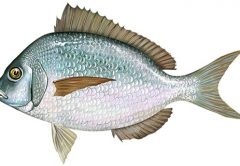By Zach Harvey
I have watched a great many dads try, with mixed results, to introduce a great many sons and daughters to our beloved sport. I have shared in the high-fives of some resounding successes—father- son or –daughter trips that have marked fortuitous beginnings to fishing partnerships bridging family generations. You haven’t seen fishing excitement until you’ve watched a 7-year-old boy lifting a bass up on the shoulder of his new winter jacket and running a dozen victory laps around the cockpit, the fish’s bloody tail dragging on the deck.
I have also stood at the rail of a party boat flanked by a father and his young boy, clutching the back of a son’s rain jacket, holding him inboard with my left hand as he decorated the port-side rub rail with deconstructed McMuffin and what looks like grape motor oil. Meanwhile, dad (right side), jackknifed over the same rail in the throes of his own post-digestive apocalypse, clung to the right sleeve of my jacket and gurgled feeble bits of sympathy and encouragement to his ailing son.
Having logged so many hours in the thick of such formative moments in family fishing, I’ve born witness to seemingly every sort of triumph or disaster, and over years, seen some clear patterns emerge. One of those—an idea that has cast a long shadow over my last four years or so—is the unshakable truth that not every kid is hard-wired for a life on the briny.
My daughter, Kaya, just turned five—the rough age I long ago attached to the phrase “old enough.” I’ve given her numerous indirect glimpses of the fishing I do, made it a point to include plenty of water, little local creeks we could just about spit across, a couple of stocked ponds inside walking distance, and all manner of saltwater habitats, in what we presented as her home turf. Last year, I took her out in the canoe, caught a fish for her close-up inspection. I must confess that after a few years fretting over the possible combined impact of The Little Mermaid, Bambi, or Finding Nemo on her view of hooks, lines, or nets, I was relieved to see her take in my catch as a natural—and exciting— event, rather than an act of cruelty or something gross.
(In fairness to Kaya, she once offered, with no prompting from me, to go out in the yard and euthanize a sickly—possibly rabid– brown bat we’d discovered. As my wife and I weighed our options in hushed voices, she marched into the kitchen with a furrowed brow. “I know what we need to do: Go out and hit it with a shovel,” she announced grimly, an air of duty in her little voice, “I’ll do it.” She was two at that point—an animal lover but also an enthusiastic seafood consumer, and a little girl with a pretty clear sense of the food chain. I probably needn’t have worried.)
As I prepare to make her introduction to fishing in earnest this coming spring, I’ve been replaying almost 20 years worth of the fishing I’ve done with thousands of other people’s children – on largge “Take A Kid Fishing” outings, on private charters, on open boats, on various docks and other shore- fishing areas—in an effort to lay out a fool-proof strategy. I’m clear about one thing: The first and best thing a dad can do to avoid catastrophe is to suspend all his own expectations about how the day will go, what his little person will (should) enjoy, and what constitutes success (or failure).
Do as much advance work as you can to free up your hands and your wits on D Day. That should include finding a semi-reliable pile of fish to attack (contrary to the feel-good crap some folks peddle, catching something, anything on reasonably short order is of utmost importance); conducting some personal recon to identify best baits, rigs, or trip timing and scouting out possible obstacles or danger spots (in surf fishing especially); tying up numerous backup rigs, preparing an extra backup outfit so you can rotate rods, keep Junior in action when she wipes out rod one with a weapons- grade tangle.
Preparations can be elaborate and they can be endless—the key concept here is that when the fishing starts, you don’t want to be barking hostile-sounding orders between wild volleys of f-bombs as you ransack the vee-berth looking for sinkers you’d have sworn you put there at the end of last season. You want to be right by the small person’s side providing quiet visual aids, gentle directions, and answers to the important questions little anglers ask to understand the day’s mission—such as whether sea gulls have boogers(?)
Expectations. Right. Here’s the reason you need to squelch four or seven years worth of the personal meaning you’ve managed to hang on one day’s fishing with a boy who routinely rocks Underoos over his jeans just because it makes him look tough: As many powerful kernels of life wisdom—some of them with major Buddhist undertones—you have unearthed during interminable casting sessions, the world of kid’s fishing has no reliable exchange rate for time against memorable fun. Nor do most young children care one iota about the bogus hierarchy of noble quarry, and lesser gamefish, and “trash” fish too many adults observe: five minutes of bait soaking and one green-eyed shark very well might represent more net joy than your kid will pull down in four hours of lock-and-load striper catching. Every fish, no matter its size or species is a good—nay, great—fish. Whatever you catch (or don’t catch), when you’re wondering how long to stick it out, take your cues from the small people: Better to call it short day and leave them excited for next time than to push it into overtime, turn the who thing into some Dad-sponsored exercise in the lethal boredom that is “character-building.”
A common bonehead maneuver made by well-intentioned, if overzealous, dads is being too quick to intervene when—Holy sh@#! Little Bobby’s got one!— the rod starts bucking and his son goes wild. It would be one thing if the boy were five and there were yellowfin tuna involved. But when it’s a scup or flounder causing the commotion on the business end of the line, best bet is to maintain your adult cool, monitor your daughter’s progress, and encourage her to try her own skill. The more of the work she does bringing in the sea monster she’s hooked, the more she’ll take ownership of the event; you’ll hear the pride in her shrill voice—and see the excitement in her face— when, an hour or month later, she regales her friends or her grandpa with tales of nautical adventure she had with Dad. When, despite your suggestions that she’s capable of fighting a fish all by herself, she insists on your involvement, best to downplay your assist in subsequent retelling of the day’s events.
I’m hesitant to close on this point, but I’m afraid there’s no way around it: Your adult control over a day’s outcome—much less the extent of your child’s desire to keep fishing over months and years is fragile at best, especially given our culture’s present-day fixation on forms of amusement that don’t require leaving the confines of a living room. What I mean is: There is, of course, the chance that your little one got a seasick gene from the in-laws via your spouse, or that, for whatever reason or reasons well beyond your actual influence, and through no fault of your own, the boy (girl) just doesn’t see the up side of picking fights with local sea life.
[easy-social-share]

